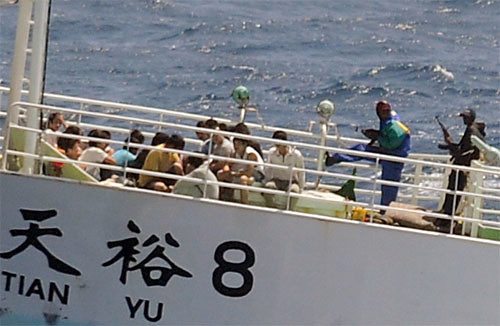Link to ArticleBy Andrew Marshall - Analysis
SINGAPORE (Reuters) - In high seas and heavy rain, the supertanker Kasagisan was steaming through the Malacca Strait in February when it was suddenly surrounded by six small boats.
The crew of the vessel, heading from Saudi Arabia to Japan with a cargo of oil, sprayed the pirate boats with the tanker's fire hose, sounded its sirens and initiated evasive maneuvers.
With the weather worsening, the pirates retreated. But the botched attack, one of at least 71 actual or attempted incidents of piracy in Asia recorded by shipping monitors in the first nine months of 2008, shows it is not only Somali pirates who have the audacity to threaten even the world's biggest tankers.
The Strait of Malacca between peninsular Malaysia and Sumatra is among the world's busiest shipping lanes, used by more than 70,000 ships in 2007, including vessels supplying about 80 percent of the energy needs of Japan and China.
Piracy in the Strait became so serious that in 2005 the Joint War Committee of the Lloyd's Market Association added the area to its list of war risk zones, sending premiums sharply higher. Concerted efforts by Malaysia, Indonesia and Singapore to tackle piracy helped slash the number of attacks in subsequent years.
But with Somali bandits attacking ships off Africa with impunity and netting huge profits, the risk is that their example could be followed by Asian pirates eager to reap similar wealth.
"I am sure that a lot of criminals and criminal syndicates in Asia are watching events in Somalia with great interest," said Noel Choong, head of the International Maritime Bureau's piracy reporting center in Kuala Lumpur.
"The Somali pirates are making so much money, and have been facing very low risk. Any time you have an activity that is low risk but with huge rewards, that will encourage criminals."
Data compiled by the Singapore-based Information Sharing Center of the Regional Cooperation Agreement on Combating Piracy and Armed Robbery against Ships in Asia (ReCAAP) show a general downward trend in piracy in the region since 2003.
But India, Vietnam and the Philippines saw an increase in attacks this year compared to 2007. And the past few months have seen several attacks around the Malacca and Singapore straits, mainly targeting tugboats towing barges.
PIRATE HAVENS
So far, Asian pirates operating around the Malacca Strait lack a secure base like the Somali town of Eyl.
"Countries in Asia have functioning governments," Choong said. "In Somalia if somebody hijacks a ship, they can get away with it. In Asia, where would you go? If you hijack a ship you would be hunted down and arrested."
But there are plenty of potential pirate havens. East of the straits, Indonesia's remote Anambas islands have seen an upsurge of pirate activity. Further east, the islands of the southern Philippines are dotted with the bases of Muslim insurgents.
This makes the Sulu and Celebes seas a piracy flashpoint -- threatening the Makassar Strait between Sulawesi and Borneo, increasingly used by Very Large Crude Carriers (VLCCs) like the Kasagisan -- and the Sirius Star seized by the Somalis this week.
"The Sulu and Celebes seas have become notorious for illegal maritime activities such as smuggling, piracy and trafficking in illegal narcotics, guns and people," said Ian Storey, a fellow of the Institute of Southeast Asian Studies, in a research note. "In short, the seas have become an ungoverned maritime space."
A particular concern of security analysts is that militant groups like the Abu Sayyaf group in pirate-infested Jolo and Basilan islands and the Moro Islamic Liberation Front in Mindanao, which have already used piracy to help fund their operations, decide to emulate the Somali strategy.
There is already a precedent.
In 2000, the Abu Sayyaf Group seized 21 people, many of them Western tourists, in a raid on a resort in the Malaysian island of Sipadan. More than $10 million was paid for their release.
A year later three Americans and more than a dozen Filipino tourists and resort workers were captured in a seaborne raid on Palawan in the Philippines. Two of the Americans were killed -- one of them beheaded -- and other hostages were held for ransom.
A further risk is that Asian pirates turn their hand to terrorism. Reports that al Qaeda-inspired militants were planning more attacks on global shipping, and even considering seizing a large ship to use as a "floating bomb," played a role in designation of the Malacca Strait as a war risk zone by Lloyd's.
The strait was taken off the war risk list in 2006. But an upsurge in piracy -- or a terrorist attack -- could change that.
"Even one terrorist attack in the Strait of Malacca likely would send insurance rates skyrocketing," Storey said.
"International pressure, the spectre of maritime terrorism, the efforts of regional states, and support from external powers have done much to improve security in southeast Asia's maritime domain," he said. "But much remains to be done."
(Additional reporting by Jalil Hamid and Niluksi Koswanage in Kuala Lumpur; editing by John Chalmers)





